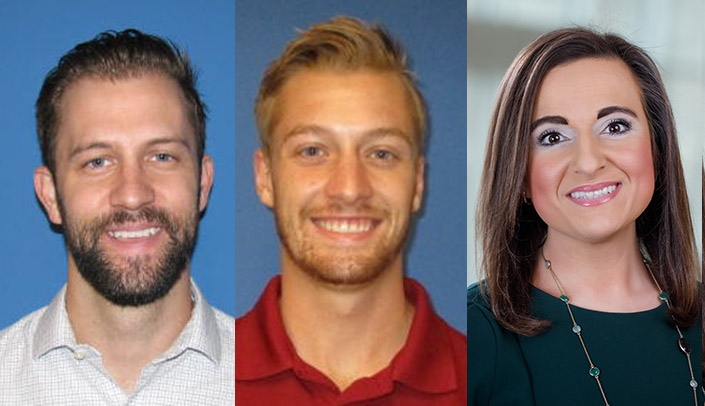A new paper published in The Primary Care Companion for CNS Disorders highlights the work of UNMC’s addiction psychiatry team and the active role that medical students play on it, said Alëna Balasanova, MD, the paper’s corresponding author, co-director of the service and associate professor of psychiatry at UNMC.
Fourth-year medical students Sean McDermott and Ben Johnson first- and second- authored the paper, "Phenibut and Bromazolam Use Disorders Requiring Hospitalization for Medically Supervised Withdrawal."
The case report also showcases one of addiction psychiatry’s major emphases, Dr. Balasanova said – the de-stigmatization of substance use disorder.
"A large part of that is motivational interviewing; learning where to meet patients where they are," Dr. Balasanova said. "It’s looking at things through a harm-reduction lens — ‘How can we help meet the patient where they are right now and help them with the needs they identify?’ — instead of ‘I have a goal going in to see this patient, and my goal is to see that they stop using substances.’
"That used to be the way things were approached, and time and time again, it turns out that doesn’t work. So, changing the way we approach things, using correct clinical language that’s not going to shame the patient for using substances, and learning how to sit with them in a non-judgmental way really lends itself to establishing that trusting relationship."
Johnson said having a broad and open-ended conversation with the patient was key to discovering what substances – Phenibut and Bromalozam, which Dr. Balasanova described as novel and esoteric — were being used and deciding how to treat the patient’s withdrawal. What made that discussion possible, he said, was engaging the patient and meeting them where they are.
"Part of what drew me to psychiatry is that interest in people’s personal stories and journeys," Johnson said. "We’ve recently talked about the idea of normalization. As we have these conversations, we try not to make these patients feel ‘abnormal,’ but to … put them in a place where they don’t feel different or bad, but a participant in an open conversation about their substance use."
Johnson, who began shadowing Dr. Balasanova as a graduate student, said the experience has been invaluable and has shaped his approach to medicine.
"I got an early exposure to harm reduction and this de-stigmatization," he said. "And in respect to substance use, I got good exposure to having conversations without judgment even before I knew the term ‘motivational interviewing’."
Dr. Balasanova sees the paper as an important advancement in the field of addiction psychiatry.
"There’s nothing in the literature about how to manage withdrawal from both of these substances concurrently" she said. "It’s rewarding for the medical community, because now they can learn from this experience as well. It becomes an official part of the literature base. So, whenever a patient who’s using these novel and esoteric substances comes into an office or hospital, providers can look this up and see what to do – and previously there was nothing."
It’s also a satisfying educational milestone, she said.
"There have been many case reports from this service by medical students mentored by faculty, which have contributed substantially to the advancement of medical knowledge," she said. "In an arena that’s so underdeveloped — substance use disorders/addiction psychiatry — there’s a lot to be explored. To have students identify interest in this and to have this be transformed into a scientific advancement in terms of a published manuscript is meaningful. The fact that we have these opportunities sets us apart from services similar to ours — of which there are very few nationally."
"While on the addiction psychiatry service, medical students will absolutely learn and practice how to nonjudgmentally talk with patients, but they will also have a very unique opportunity to move medicine forward in a tangible way," Dr. Balasanova said.
McDermott agreed. A medical student planning on going into a surgical field, he said he learned lessons in the rotation that would apply to any physician.
"Dr. Balasanova did an excellent job on the first day of our rotation exploring our career interests as students," he said. "She was able to slightly alter the focuses of the rotation, so that we could get the most out of it. I learned about the transplant process, substance use management around the time of surgery, and the essentials of meeting patients where they are at when it comes to substance use treatment. The addiction psychiatry rotation can provide benefit for students interested in any profession."

Dr. Balasanova's passion for her patients as well as her commitment to educating future clinicians who care for those suffering from addictions is inspiring! The success of her students will clearly be her legacy!
Congratulations team!
Dr. Balasanova always goes the extra mile with any and all of her students when they are learning from her on the Addictions Psychiatry CL services rotation! So glad these two med students could benefit from her professional mentorship. And major "kudos" to all of you for the important research paper you just got published!